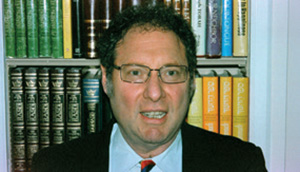
A mourner who has buried a beloved wife, mother or father returns home from the graveyard where he has left part of himself, where he has witnessed the mockery of human existence. He is in a mood to question the validity of an ethical universe guided by a caring God. The house is empty, dreary, every piece of furniture reminds the mourner of the beloved person he has buried. Every corner is filled with memories. Man, broken in body and spirit, feels life is absurd. Can one experience utter bleak desolation and hopelessness and cast off his grief eventually?
Death is the great mystery. Death is what we fear, what we don’t talk about, what we try not to think about.
While that someone was near, while we could communicate with that person, we were unaware of him, we didn’t appreciate him, as if he were a nobody. We were not aware of the great chesed God granted us, enabling us to be with him. He comes into existence and turns into somebody important and precious at the very moment he departs from us. Only after he is gone do we begin to ask: Who was he? What did he mean to me? Why did I not appreciate him more?
Before burial, when the mourner is an onen, man mourns in total darkness and confusion, unable to acknowledge his greatness, his dignity and chosenness.
After burial, the mourner, the avel, slowly elevates himself. The recital of Kaddish is a praise of God, an awareness that, far from being insignificant like the beasts of the field, man is important enough for God Himself to be concerned with his praise. Saying Kaddish, then, is a defiance of death, a statement not only about the greatness of God, but about the greatness of man. Through the Kaddish we hurl defiance at death and its fiendish conspiracy against man. Death gives man the opportunity to display greatness and to act heroically; to build even though he knows that he will not live to enjoy the sight of the fruits of his labor.
God summons each of us to His service. Our existence is not a freak accident but a meaningful assignment, abounding in responsibility and commitment. Each person has a unique mission and purpose on this earth.
When one lives an illusory eternity he may miss the message; but when sensitized to the flow of time, one becomes vigilant, anticipates the future and regards each moment as precious. God placed each person at a specific time and place for a reason. A person’s creation implies a twofold message: his service is required, and he has the ability to act. He must not ignore or misread this message.
Rav Yosef Yozel Hurwitz, the Alter of Novardok, once raised his eyes and hands heavenward and said, “In the future, every individual will be asked why he did not light up the world like the sun at noontime.”
We have very little time on this earth. So much of life is fleeting and temporal. If we are going to invest our greatest asset, time, it should be spent involved with meaningful activities, bringing joy to the Creator and bringing us honor and dignity, and that contribute in some way to the redemption of mankind, that bring the geulah closer.
Rav Nathan of Bratslav wrote his son the following: “Into every day, get as much Torah and good deeds as you can, as much as you can steal from this passing shadow, this vanity of vanities, this vanishing cloud; all our days are vanity, yet every man on whatever level he may stand can attain eternal life.”
Yes, every man, on whatever level he may stand, can inherit life in the next world. The rabbis taught about the cruel Roman executioner of Rabbi Chananya ben Tradyon, who in just one moment of mercy and kindness inherited the next world by helping the rabbi suffer less and ending his life quicker, without more tortuous pain.
Jews are buried in a kittel, a shroud, a garment without pockets, teaching us that we cannot take our money and possessions with us to the next world. We can only bring the mitzvot we have performed and our good deeds with us. It is our reputation that will linger on, long after our bodies expire. Judaism teaches that we defeat mortality by engraving our ideals on the hearts of our children, and they on their children, unto the end of time.
A few days before his death, Rav Simcha Zissel Ziv, the Alter of Kelm, asked to have all his clothes laundered. Since after his death his clothes would be given away, he wanted to be sure that the poor would receive the clothing clean and pressed. How selfless, even before his death on his way to the next world, the Alter of Kelm was worried about the people he would be leaving behind.
On the day the Baal Shem Tov died, when people crowded around his bed mournfully, he chided them and said, “It is written: ‘She laughs at the final day.’ Proverbs 31:25.” One must rejoice when the soul departs from the body and rises upwards.” He ordered them to light candles in the Shabbos candlesticks and to bring musicians to accompany his departure with song and joy.
This is how one prepares for that greatest of mysteries, death.
By Martin Polack
Martin Polack is a business analyst, involved in adult Jewish education.













